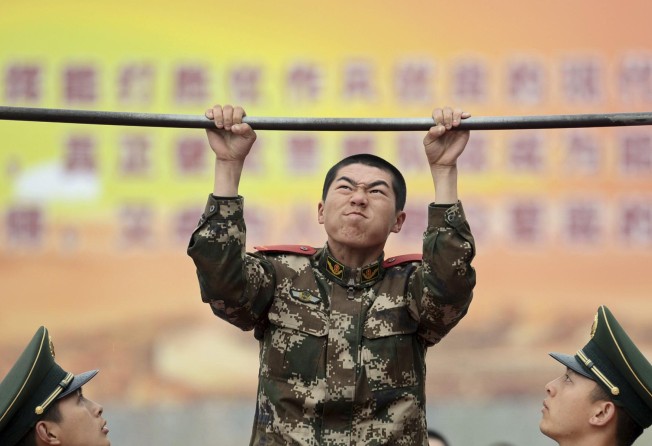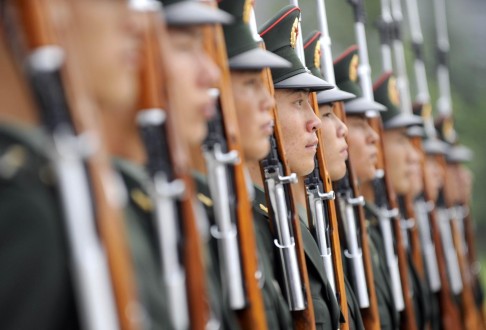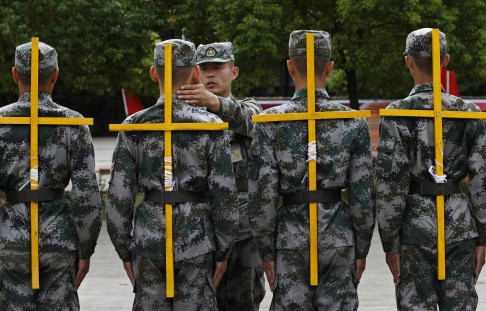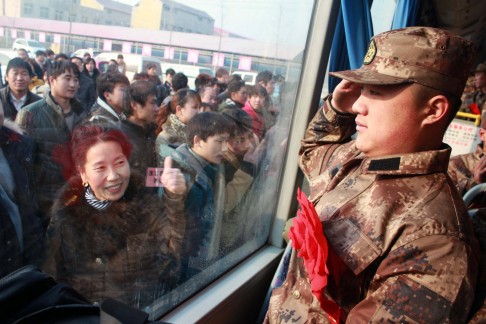
The Young Guns of China: Beijing steps up efforts to recruit a new generation of soldiers
While Beijing increases its defence spending and updates its military hardware, it is also stepping up efforts to recruit a new generation of soldiers

China's military has used annual budget increases of more than 10 per cent to buy precision-guided weapons, fighter jets and its first aircraft carrier.

For Wu, a 20-year-old journalism student at a university in Beijing, that means his college fees are paid and he has an extra 3,500 yuan (HK$4,390) a year to live on.
Wu, identified only by his surname because he is forbidden from speaking publicly, takes extra lessons on war strategy alongside regular classes.
He will join the People's Liberation Army as a trainee officer when he graduates in 2016.
"In the past, our weapons were quite primitive so you didn't need too much knowledge," Wu said. "You just used a gun and that was okay. Now there's a need for better quality people."

President Xi Jinping, the head of the Central Military Commission, has made an army that's better prepared for combat a priority as China becomes more assertive in territorial disputes.
Beijing plans to fold developers of military hardware into listed state-owned companies, sources said, giving them access to capital markets as it prioritises hi-tech defence capability.
"Their biggest difficulty right now is recruiting and retaining technical non-commissioned officers," said Christopher Johnson, of the Centre for Strategic and International Studies in Washington.
"They're getting all these shiny new pieces of gear and if you're operating off a conscription system those guys are two years and out. By the time you train them up, they are already leaving."

The recruitment of soldiers this year would run to August, said a notice on the government's official recruitment website.
A series of beneficial policies had "inspired the patriotic enthusiasm" of college students to join the army, the PLA Daily reported.
The proportion of graduates signing up for the military reached about 10 per cent in most places during the recruitment period last year, it said. The number of students applying online to join the military passed 200,000 last August, Xinhua reported.
Recruitment campaigns include drives at universities. Last August, female astronaut Liu Yang answered questions from high school students at Renmin University in Beijing to promote sign-ups.

China's Ministry of Defence didn't respond to questions sent by fax about the focus on college recruiting. "The Chinese People's Liberation Army are not Boy Scouts with red-tasseled spears," Foreign Ministry spokesman Qin Gang said last month in response to a question on Beijing's rising military spending and capacity.
The central government is boosting defence spending by 12.2 per cent this year to 808 billion yuan. But while China's military spending has roughly kept pace with economic growth in recent years, the 2.3 million-strong PLA must keep up with rising wages in the civilian sector.
That was likely to make things more expensive for the PLA, though there wasn't enough data to estimate how much, said Andrew Erickson, an associate professor at the US Naval War College.
China should enhance the attractiveness of being an officer and pay salaries "significantly higher" than civil servants, Du Renhuai, a professor at the PLA Nanjing Institute of Politics, wrote in the PLA Daily.
"Their economic, political and social status should be at the forefront of society," he added.
Chinese students now expect a monthly salary of 6,564 yuan after graduating, according to a survey by New York-based employer branding firm Universum.
That compares with about 4,000 to 5,000 yuan a month that student Wu expects he will earn when he joins up. While Wu said he could earn more in the private sector, he said the army also took care of food and lodging.
"It solves the problem of employment after you graduate," said Wu. "Competition for jobs in China is quite fierce. Being enlisted in the army is stable."
Other perks include granting sought-after residency permits, known as a hukou, to those who graduate in Beijing.
But an officer, who gave only his surname Liu, said the recruitment programme mostly attracted students from the countryside. Liu, 25, received an extra 500 yuan a month in living expenses while a defence student at a university in Wuhan , before joining the army in 2011.
"To some in poor areas it is quite attractive, but you can't say it's attractive for everyone," he said. "I joined for a simple reason - to serve my country."
Efforts to boost the quality of recruits had been hampered by a decline in health, with 60 per cent of applicants from colleges failing the physical fitness examination and some being overweight, China Daily reported.
Improving pay and quality of recruits may also have a side benefit as Xi campaigns to curb corruption within the army.
In the most high-profile military corruption case since the Communists came to power, former Lieutenant-General Gu Junshan was charged with embezzlement, bribery and abuse of power. Gu, 57, entered the military from middle school after being raised in a village in Henan province.
"If you pay people better they're less likely to feel the need to seek other sources of income," said Andrew Scobell, a political scientist with the Rand Corporation. "There are all these incentives to try and attract the kinds of people they need."
For student Wu, the rewards are only part of the appeal. "If some people want to earn lots of money they can realise their ideals, but I believe I can realise my own ideals by being in the army and helping to protect the country," he said.